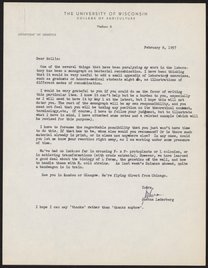Oral history interview with Joshua Lederberg
- 2000-Aug-18
Oral history interview with Joshua Lederberg
- 2000-Aug-18
Joshua Lederberg begins the interview with a discussion of his involvement in the contamination issues of planetary exploration. As interest in space exploration gained momentum, Lederberg was in the midst of discussion regarding protecting the Earth from possible extraterrestrial contamination. Lederberg felt that more emphasis needed to be placed on building a sound space program, one that focused more on planetary research rather than sending humans into space. Lederberg worked to develop alternatives to the "man-in-space" program, focusing on the importance for international cooperation. Lederberg served on several national committees, including the Space Science Board and the Kennedy Health Transition Team. After receiving the Nobel Prize in 1958, Lederberg joined the faculty of Stanford University, where he continued his life-long research in the genetic structure and function in microorganisms. Lederberg continued to be actively involved in artificial intelligence research and in the NASA experimental programs seeking life on Mars. He has also been a consultant on health-related matters for both the U.S. and international communities, serving on the World Health Organization's Advisory Health Research Council. Lederberg wrote his own column on a wide variety of topics, both scientific and non-scientific. Lederberg concludes the interview with a discussion of the environment at Stanford University during the Cold War and thoughts on U.S. defense projects.
| Property | Value |
|---|---|
| Interviewee | |
| Interviewer | |
| Place of interview | |
| Format | |
| Genre | |
| Extent |
|
| Language | |
| Subject | |
| Rights | Creative Commons Attribution-NonCommercial-NoDerivatives 4.0 International License |
| Rights holder |
|
| Credit line |
|
Institutional location
| Department | |
|---|---|
| Collection | |
| Oral history number | 0199 |
Related Items
Interviewee biographical information
| Born |
|
|---|---|
| Died |
|
Education
| Year | Institution | Degree | Discipline |
|---|---|---|---|
| 1944 | Columbia University | BA | Biology |
| 1947 | Yale University | PhD | Microbiology |
Professional Experience
United States. Navy
- 1943 to 1945 V-12 and Hospital Corps: Ens. USNR
Columbia University
- 1945 to 1946 Research Assistant, Zoology
Yale University
- 1946 to 1947 Research Fellow, Jane Coffin Childs Fund for Medical Research
University of Wisconsin--Madison
- 1947 to 1950 Assistant Professor of Genetics
- 1950 to 1954 Associate Professor of Genetics
- 1954 to 1959 Professor of Genetics
- 1957 to 1959 Chair, Department of Medical Genetics
University of California, Berkeley
- 1950 Visiting Professor of Bacteriology
University of Melbourne
- 1957 Visiting Professor of Bacteriology
Stanford University. School of Medicine
- 1959 to 1978 Professor of Genetics, Biology, and Computer Science
- 1959 to 1978 Chairman, Department of Genetics
Rockefeller University
- 1978 to 1990 President
- 1990 to 2001 University Professor Emeritus
Honors
| Year(s) | Award |
|---|---|
| 1957 | National Academy of Sciences |
| 1958 | Nobel Prize for Physiology or Medicine |
| 1960 | Sc. D. (honorary), Yale University |
| 1961 | Alexander Hamilton Award, Columbia University |
| 1961 | Wilbur Cross Medal, Yale University |
| 1961 | Proctor Medal, Sigma Xi |
| 1967 | Sc. D. (honorary), University of Wisconsin |
| 1967 | Sc. D. (honorary), Columbia University |
| 1969 | M.D. (honorary), University of Turin |
| 1970 | Sc. D. (honorary), Yeshiva University |
| 1979 | Litt. D (honorary) Jewish Theological Seminary |
| 1979 | Foreign Member, Royal Academy of Sciences |
| 1979 | LL. D. (honorary), University of Pennsylvania |
| 1980 | Honrary Life Member, New York Academy of Sciences |
| 1981 | Sc. D. (honorary), Rutgers University |
| 1981 | Honorary Fellow, New York Academy of Medicine |
| 1982 | Fellow, American Association for the Advancement of Science |
| 1982 | Fellow, American Philosophical Society |
| 1982 | Fellow, American Academy of the Arts and Sciences |
| 1984 | Sc. D. (honorary), New York University |
| 1985 | M.D. (honorary), Tufts University |
| 1988 | Distinguished Service Medal, Columbia University |
| 1989 | National Medal of Science |
| 1991 | D.Phil. (honorary), Tel Aviv University |
| 1993 | Founding Member, Académie Universelle des Cultures |
| 1995 | Allen Newell Award, Association for Computing Machinery |
| 1996 | John Stearns Award for Lifetime Achievement, New York Academy of Medicine |
| 1997 | Mayor's Award in Science and Technology, City of New York |
| 1997 | Maxwell Finland Award, National Foundation of Infectious Diseases |
| 1998 | Dr. Mil. Med. (honorary), USUHS |
Cite as
See our FAQ page to learn how to cite an oral history.
Complete transcript of interview
lederberg_j_0199_FULL.pdf
The published version of the transcript may diverge from the interview audio due to edits to the transcript made by staff of the Center for Oral History, often at the request of the interviewee, during the transcript review process.








